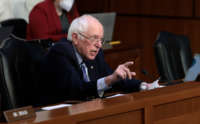
According to new estimates that the Census Bureau released on Thursday, the 2020 census undercounted Black people, Latinx people and Native Americans, which advocates have warned could potentially lead to voter disenfranchisement.
All three groups were undercounted at higher rates than they were a decade ago. Latinx people were undercounted by about 5 percent, or over three times the rate from 2010. Black people were undercounted by about 3.3 percent, while Native Americans on reservations were undercounted by over 5.6 percent.
Meanwhile, non-Hispanic white people were overcounted by 1.64 percent, the bureau found. The miscounts, which have already been used for redistricting, could give disproportionate power to white populations while further disenfranchising populations that already face voter suppression. The more accurate population counts from Thursday’s report won’t affect redistricting, according to the New York Times.
Experts say that the high miscounts may be the result of difficulties due to COVID and attempts to suppress the census by former President Donald Trump. Meddling from the Trump administration “wreaked havoc” at the Census Bureau, NPR reported earlier this year, and pressured the agency to exclude undocumented immigrants from the count.
Trump ultimately succeeded in getting the count cut short by a month. Experts say that his efforts were a transparent campaign to expand GOP power while also potentially sabotaging local governments, who receive funding based on census counts.
Population counts from the census can be used by redistricting officials to determine the number of districts in a state that should be majority non-white. The government also uses census data to guide decisions on where to direct about $1.5 trillion a year to state and local governments for things like health care. The bureau has long undercounted marginalized populations and overcounted white people.
Groups representing Black, Indigenous and Latinx people were outraged over Thursday’s report.
“A year ago when the first results of the 2020 Census were released, we said we smelled smoke. The [Census Bureau’s] estimates released today confirm that this census was a five-alarm fire,” Arturo Vargas, the CEO of the National Association of Latino Elected and Appointed Officials Educational Fund, said in a statement. Vargas said in a press call that he had never seen such a large undercount of Latinx people in over three decades of following the census.
“These results confirm our worst fears,” Fawn Sharp, president of the National Congress of American Indians, said in a statement. “Every undercounted household and individual in our communities means lost funding and resources that are desperately needed to address the significant disparities we face.”
Groups like the National Urban League say they may file litigation over the results, but there may be limited legal options to remedy the issue. “We’ve talked about voter suppression. Now we see population suppression,” National Urban League president Marc Morial said.
Advocates have previously sued over Trump’s obstruction of the count, alleging that the bureau violated its duty, as set by the Constitution, to accurately count the population.
This post was originally published on Latest – Truthout.




























